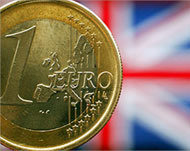EU weighs easing of monetary rules
EU finance ministers have met to amend rules for securing a stable euro, debating ideas to meet German and French demands to spend their way out of economic downturns.

Negotiations to reform the EU’s Stability and Growth Pact – while retaining its key requirement that a Euro-zone nation’s annual budget deficit cannot exceed 3% of gross domestic product – have been deadlocked for months.
The lack of consensus was clear from the start of Sunday’s meeting in Brussels.
Austrian Finance Minister Karl-Heinz Grasser – who ardently opposes a weakening of EU monetary rules – described the latest ideas for reform as a “huge joke”.
But ideas for reform – contained in a 19-page report and unveiled by Luxembourg Prime Minister Jean-Claude Juncker,
whose country currently holds the rotating EU presidency – went a long way to satisfy demands by Germany, France and Italy for a less strict application of monetary rules that underpin the euro’s stability.
They would lead to a significant weakening of monetary rules if adopted.
Grace period
Under the plan, any country exceeding the 3% norm may invoke its own reasons as to why it should be allowed to violate EU rules, and those exceeding the limit could be given a four-year grace period in which to comply.
Since it would take a year to issue a return order, violators
would effectively get five years before coming in line with EU rules.
 |
|
Violators have five years to fall |
But the latest proposals no longer contain a list of 16 excuses that rule violators may use to escape sanctions.
Germany said the list was still too restrictive, while other countries complained it was too broad.
German Finance Minister Hans Eichel said he “hoped very much … that we come to a consensus. We are ready to compromise”.
But Grasser objected to a proposal that governments be given “special consideration” if they exceed the deficit norm when they spend on projects “fostering international solidarity” or that aim to achieve “European policy goals”. He called that “a carte blanche” to spend public funds.
Norm breakers
Germany wants credit for the huge sums it is paying for its post-Cold War reunification, and for its contributions to the EU budget, of which it pays 22%.
France wants to use its spending on research and defence as an excuse to break the 3% norm. Grasser said that being lenient on Berlin because of German unification spending would turn the stability pact “into a huge joke”.
 |
|
France and Germany want credit |
If the finance ministers fail to agree, the issue of reforming the stability pact rules written in the late 1990s will go to the 25 EU leaders, who open a two-day summit in Brussels on Tuesday.
Euro reform negotiations began last September. From the outset, the Netherlands, Sweden, Austria, Slovakia, Estonia, Latvia and Lithuania have resisted a significant weakening of the stability pact while Germany and France have said they need to use public funds to stoke growth, even if it means making the 3% rule meaningless.
On Friday, German Chancellor Gerhard Schroeder insisted on a “flexible implementation (of the monetary rules that is) good for stability, but also promotes growth”.
No to meddling
Complicating matters is the fear that rewriting the monetary rules will give the European Commission a bigger role in monitoring compliance.
Increasingly, national capitals want the EU not to meddle in national economic policymaking.
The euro is the common currency of 12 EU nations: France, Germany, Italy, Spain, Portugal, the Netherlands, Belgium, Luxembourg, Ireland, Austria, Finland and Greece.
Since it came into circulation in 2002, France and Germany have repeatedly violated the 3% of GDP rule, but resisted sanctions from the European Commission by rallying support from other countries that the European Commission interprets the Stability and Growth Pact too harshly.